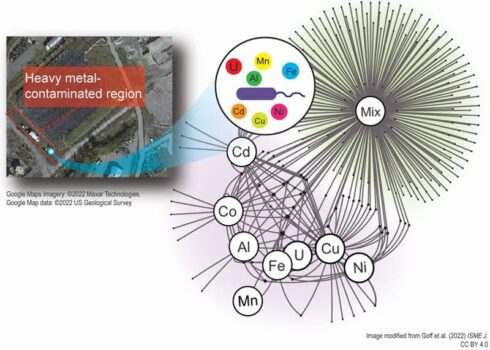Mixed metal waste common to industrial dumping sites causes a distinctive physiological response in bacteria that does not occur during single metal exposure.

Left: Bacterium growing with high levels of multiple metals in the Oak Ridge Reservation subsurface. Right: Graphic representation of the proteomic response to different metal exposures. Dots represent proteins that changed in abundance during metal treatment (large circles).
ENIGMA researchers at Lawrence Berkeley National Laboratory and University of Georgia explored how metal mixture exposure impacts bacteria living in a polluted environment. Because bacterial enzymes play a crucial role in so many essential ecosystem processes, studying the effects of metal pollutants on bacteria living in these environments is necessary in order to understand nutrient cycling and pollutant removal (i.e., bioremediation) at these sites. The researchers found that metal mixture exposure disrupted bacterial processes that depend on iron. This finding is important because many bacterial enzymes involved in bioremediation and nutrient cycling require iron to function correctly.
Read more in the Department of Energy publication highlight.
Publications
Goff, J. L., Chen, Y., Thorgersen, M. P., Hoang, L. T., Poole II, F. L., Szink, E. G., Siuzdak, G., Petzold, C. J., & Adams, M. W. W., Mixed heavy metal stress induces global iron starvation response. The ISME Journal (2022). [DOI: 10.1038/s41396-022-01351-3]
